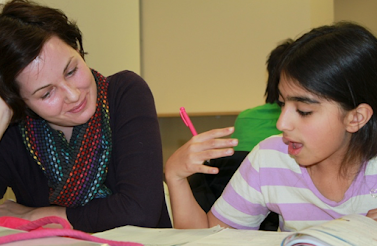 |
| Source: Edutopia |
(Note: Our series of blog posts on chronic school absenteeism are excerpts from a larger briefing paper entitled, Chronic School Absenteeism and the Role of Afterschool.)
“Leveraging the power of afterschool programs to reduce chronic absence is especially important now given the economic challenges facing communities and schools and the growing number of students at risk of academic failure and dropping out. By having an impact on attendance, afterschool programs can clearly demonstrate how they benefit students and schools and better justify their own funding.” [i]
There are many strategies that afterschool programs can consider implementing to reduce school absenteeism. Some of these are listed below.
- Meet with staff and provide training to build awareness of the importance of school attendance, share school and program data.
 |
| Source: Temescal Associates |
- Conduct a program self-assessment to determine the strengths and weaknesses of addressing absenteeism. (In Chronic School Absenteeism and the Role of Afterschool, see Appendix 2 for a program assessment tool. Tally the results and discuss. Make an improvement plan, implement, and assess progress.)
- Send A Clear, Consistent Message-About School Attendance
“They [program leaders] need to begin with a strong and clear message that attendance is important and why. This message needs to be consistent with messages from the school, and also communicated to both youth and parents. Likewise, in order to get staff buy-in, they need to understand the importance as well.” [ii]
- Improve Program Quality:“Afterschool programs impact attendance through the hands-on, creative learning approaches that tend to be more prevalent in after school programs than in more traditional classroom settings. The relationships between youth in afterschool programs with the staff tend to be far different than those with their teachers.” [iii]
- Monitor Attendance Data and Practice:“In order to know the extent of the issue and where to focus your efforts, it’s important to track attendance and progress. Be sure that staff take and maintain records on attendance daily. This should also be coordinated by talking with the school attendance office regularly.” [iv]
- Offer Academic Support:“Some of the ways that after school programs impact attendance include tutoring and homework assistance – forms of academic support…. This support network both assists the youth with the content area, but also increases their self confidence in the work they are completing.” [v]
- Recruit School-Day Teachers as Afterschool Workers: Having teachers be part of the afterschool program strengthens the connection with the school and individual teachers.
- Incentives, Contracts and Recognition: After identifying youth participants who are often absent, develop ways to incentivize attendance. Consider working with the youth to develop a contract related to attendance. Afterschool programs, often times, in and of themselves, are a reward to youth who participate and is something they look forward to at the end of their school day.
- Provide Personalized Early Outreach: Notice absenteeism and intervene early on. Don’t wait for it to become “chronic”. Identify these youth and see if you can identify and mitigate some contributing causes.
“By providing a personalized and early outreach approach you can increase your chances of success. Someone reaching out to a family regarding attendance issues should already have a relationship with them. There needs to be some rapport that enables open conversation and trust. Knowing the issues that are impacting attendance is important to begin to consider ways to help. Are there health issues, transportation issues, shelter issues?” [vi]
- Involve Parents and Guardians: Often it is not enough to engage youth alone. We need to involve parents and guardians to address chronic absenteeism. “Some programs, when they stop and consider it, haven’t really invited parents to the program…Reach out and invite them to the program. Hold a parent meeting, host a dinner or reception where they meet staff and youth show off their work or an activity. Consider the time of an event and how you can support the parents, especially those with other young children, to maximize attendance. Some programs offer day care for younger siblings or offer dinner during the event, so they don’t have to rush out and worry about that afterwards.
Parents will tend to be more invested when they know and better understand the positive impacts and negative consequences of attendance at school. This includes both excused and unexcused absences, which collectively, when they increase, have an impact on the youth. A positive program culture that is inclusive of youth involvement, increases youth commitment and ownership in the program, and enables youth to feel like partners with the staff and adults.” [vii]
- Enlist Additional Partners: Schools and afterschool programs cannot solve absenteeism alone. They do not have control over many external factors that affect student attendance. “Some remedies to chronic absence may require a web of human resources, including pediatricians, mental health providers, schools, public health partners and others.” [viii]
 |
| Source: www.pexels.com |
“Improving student attendance is the responsibility of an entire community, not just schools. Community partners (parents, neighborhood residents, civic organizations, businesses, city and county agencies, faith leaders, etc.) are instrumental to every level of a tiered approach. Community partners can help send the message that missing just two days a month can hinder a child’s success in school. Additionally, partners can provide recognition for good and improved attendance as well as address common barriers to getting to school such as poor health, unreliable transportation, or the lack of a safe path to school. If larger numbers of students are chronically absent, then it is a sign that you may need to cultivate additional adults who can help mentor and support students.” [ix]
[i] Building a Culture of Attendance: Schools and Afterschool Programs Together Can and Should Make a Difference!
[ii] Supporting Attendance Through After School Programming Mini-Guide
[iii] IBID.
[iv] IBID.
[v] IBID.
[vi] IBID.
[vii] IBID.
[viii] Chronic Absence: Busting Myths and Helping Educators Develop More Effective Responses
[ix] IBID.





No comments:
Post a Comment